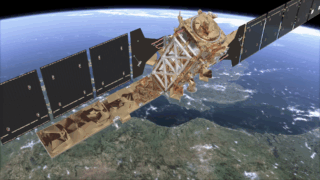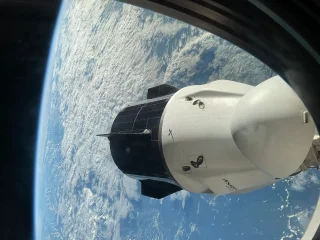Thomas Ormston
Deputy Spacecraft Operations Manager for Sentinel-1 – ESOC

I work at the European Space Operations Centre (ESOC) which is part of the European Space Agency (ESA) and my job title is deputy spacecraft operations manager for Sentinel-1.
I got my job through the Young Graduate Trainee Program that ESA runs. For all the member states, once you finish university you can do a one year placement at one of the ESA sites, that’s what I did – I applied in my final year to come and work where I currently work at ESOC in Germany, flying Mars Express. After the year I stayed on because I liked it so much as a contractor for ESA and then later became ESA staff again, and that’s where I’m working now in Earth Observation.
Describe a typical day:
I would say a typical day is completely untypical for us. That’s part of the joy of operations and spacecraft – you never really know what’s going to come from one day to the next. Of course, it starts with checking on how the satellite we look after is doing… What are the parameters showing us? Is it working how it’s meant to be? Do we see any problems on the horizon? Then sometimes we must rush into firefighting and troubleshooting those. If it’s giving us a nice calm day, we look into what it’s going to be doing next and planning its coming activities. We also look at the long-term health of the satellite – Is it performing how we expect it to? Is there something we need to get on top of, or start monitoring? We also plan for worst-case-scenarios. We consider what could go wrong and how we would fix it. Of course, if we have a plan and procedure in place that we’ve practiced then it makes it much easier to fix it if and when, one day, it does break.
Top tip from Eimear for those interested in a similar career:
There’s a lot you can do if you’re considering this job or indeed any job in the space industry. The first thing to point out is that the subjects, for the skills you need to build up, are the typical skills you need to build up for most jobs. You need to be good at teamworking, you need to be good at thinking critically, you need to have common sense… Being able to work with computers is pretty much a must. Having decent maths skills, science skills and things like that is also very useful… but beyond that there’s a lot you can do from very early on to get involved in the Space world. For us, if you look at the ESA website, there’s lots of opportunities when you’re in school and particularly when you get to university. There’s lot of programs ESA run where you can get involved, you can come to ESA sites, learn what we do on special training courses, you can take part in ESA programs that will help fund you to fly in a zero-G aircraft, or even putting your projects/experiments on a sounding rocket…things like that. So, there’s lots of ways you can get involved with ESA from early on. Not only does that look great when you finally apply, it’s also a lot of fun because you get to meet people from all over Europe who are also super interested in Space so the thing I would say is to keep an eye out there. It’s not just ESA, there’s lots of programs to help you get involved in Space and STEM subjects in general and all of those look good and build the skills that you need to work in the Space industry.
